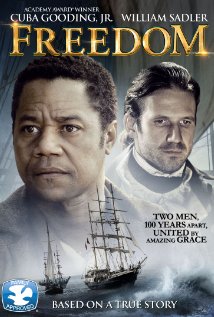Whenever we are reminded of the injustices of one human being enslaving another, we shudder, and then quickly breath a sigh of relief that humanity has moved past such atrocities. Yet, the movie Freedom starkly reminds us in its closing moments, that “today there are over 29 million of our brothers and sisters living under the tyranny of slavery, more than any other time in history.” The slavery of today is present in almost every country in the world, in the form of human trafficking.
Freedom tells the stories of two men who both endured slavery of physical personhood, as well as spirit. John Newton was an Englishman, born in 1725. He unwillingly joined the Royal Navy by force, and was punished publically after attempting desertion. He later became enslaved to African slave dealer, Amos Clowe, whose wife abused and mistreated Newton. He was rescued by a sea captain and on his voyage back to England, Newton had a conversion to Christianity, after enduring an almost fatal storm aboard the ship.
Despite having been enslaved himself, and his religious conversion, Newton continued to make voyages aboard slave ships and invest in slaving operations. Newton devoted many years to religious study, and in 1764 became an Anglican priest. Finally, in 1788 Newton’s Christianity fully took root, and he became an abolitionist, releasing a pamphlet describing the horrific conditions on the slave ships.
Newton is connected to Samuel Woodward, a slave on a Virginia plantation 100 years later, by “Amazing Grace.” Newton himself wrote the song, inspired by his own religious conversion, influenced by his conviction against slavery.
Woodward and his family escape the cruel confines of the Monroe plantation in Richmond, VA, by means of the Underground Railroad, which brings them into Canada. As the story progresses, Samuel’s mother urges him to both sing and have faith in God. She fondly recalls her father’s memory, who we learn was a boy on one of Newton’s slave ships. Samuel rejects God until the end of the movie, when providence and an opened bible with an inscription, inspires him at last to fall to his knees and sing.
I was most inspired and challenged by the Quakers, who helped to move slaves to freedom through the Underground Railroad. They carried no weapons, putting their lives on the line and their faith in God. This made me consider what I would have done in their position, when conscience and law are at odds, and punishment may mean death. One of these Quakers, when challenged for his dissention said, “I follow my conscience, whatever the consequence.” Likewise, the Quaker who safely brings the family through Virginia, gives Samuel his compass. With this gift, he says, “Your first taste of freedom. You were meant for it.” The recognition of Samuel’s true personhood, meriting freedom, could certainly have been explored in greater depth.
The movie dances on the line between musical and drama. While there is an artful nature to adding the deeply soulful slave songs and hymns of the time, there are also moments when the songs are oddly placed. Freedom attempts to address two very unique religious conversions of historical figures, and connect them through Newton’s famous hymn. I found the movie well-intentioned but reaching. The attempt to pack a century of history, depth of issues, and storyline drama ultimately came up short in all three.
Freedom is rated R for some violence and is available on DVD.
When you purchase this movie through any of the affiliate links in this post, you support the work we do at CatholicMom.com at no extra cost to you!
Copyright 2015 Kimberly Cook.
About the Author

Guest
We welcome guest contributors who graciously volunteer their writing for our readers. Please support our guest writers by visiting their sites, purchasing their work, and leaving comments to thank them for sharing their gifts here on CatholicMom.com. To inquire about serving as a guest contributor, contact editor@CatholicMom.com.



.png?width=1806&height=731&name=CatholicMom_hcfm_logo1_pos_871c_2728c%20(002).png)
Comments